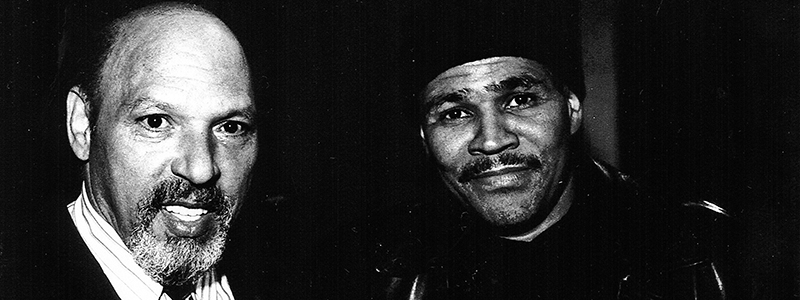Q&A: Director Ron OJ Parson
 Production Dramaturg Martine Kei Green-Rogers sat down with Director Ron OJ Parson to discuss his long history with August Wilson’s work and why he keeps coming back to it.
Production Dramaturg Martine Kei Green-Rogers sat down with Director Ron OJ Parson to discuss his long history with August Wilson’s work and why he keeps coming back to it.
As a dramaturg, I am always interested in the question “Why this play? Why this play now?” Why did you want to direct Radio Golf?
Because it is August Wilson. I always want to direct August Wilson—particularly the later ones, the ones that I have not done as much. This production of Radio Golf is my 25th production of Wilson’s work. I am proud of that. I learn something new every time I direct his plays. At Court, my home theatre, we did a reading of Radio Golf during an August Wilson reading series sponsored by Goodman Theatre. I was reintroduced to the play, and I was once again moved by these characters and the rhythm of the language—it made me want to go on that journey once again.
How do you feel the play is relevant to audiences now?
All plays about the black experience are relevant today because we continue to battle forces that are against us. Plus, anytime you can introduce a younger generation to Wilson’s work, it’s important and relevant. Wilson is one of the most profound and prolific black writers in history. Considering the crazy politics of today, a play like Radio Golf, which is about the political scene, is particularly relevant. These characters feel (to the audience) like real people going through things that could be happening in today’s world.
One of the things that is interesting about Radio Golf is the conversation around the pros and cons of gentrification. And more specifically, 1990s gentrification. Do you have any thoughts about gentrification in Chicago now, in 2018? Does it seem the same (or different) than the way it is discussed in the play?
Wilson touches on gentrification in a lot of his plays. And, yes, it certainly relates to Chicago or any larger city. Neighborhoods are definitely being gentrified. Property is being taken and redistributed all over Chicago—South, North, and West. In my hometown of Buffalo, New York, it is happening again, too. In this political climate, I don’t want to harp on this, but there is a new aggressiveness to take back the country, and gentrification is a part of that—part of “Make American Great Again.” For me, it is a situation where, when you think about the play in these terms, it is hard not to see how this play isn’t relevant. Wilson’s characters and the subjects they bring up always make it worthwhile to explore. It is something people need to hear and see.
Since we are conducting this interview a few weeks before the first rehearsal, what excites you about the upcoming rehearsal process?
This group of artists is new to me except for a few people. Working with new actors on the same text is always fun and unique. I learn new things about the text when new actors and designers come together to help me tell the story. I have a few actors in this cast who have not done Wilson before. It is thrilling for me to watch their excitement to perform Wilson for the first time.
Are there any challenges specific to this particular Wilson piece?
There are always challenges when you approach a gifted playwright, like getting actors that are new to Wilson to find the rhythm of his language. Even the ones that are not new to Wilson need direction in order to get it just right. It is a new set and sound design—those come with challenges. Even when you direct multiple productions of the same play, no production is exactly the same as the previous one. The rhythms might be the same, the energy and music of the piece may be similar, yet there are artistic differences that make creating multiple productions worthwhile. The next one is usually richer and deeper.
What is your favorite moment in the play?
Harmond’s monologue—when he talks about Oprah Winfrey. It is the one that begins with “No. Common sense says that ain’t right. We see it different. No matter what you always on the edge. If you go to the center you look up and find everything done shifted and the center is now the edge. The rules change every day.” This monologue makes me think about all of the things white people expect out of black people. Also, I love some of the things Old Joe says. His comments about his history and his ancestors make me think of the connections we have, or should have, to our own ancestors. This is an ongoing theme in Wilson’s plays, particularly this one. Harmond goes through a big transformation in the play as he realizes his spiritual connection to his ancestors. I wonder how much of that we believe in these days.
Any other fun tidbits you want to share with our audience?
It is always an honor and a pleasure to work on August Wilson at Court Theatre. We do something special in this theatre because of the intimacy of the space. People know when they come to see it at Court, even if they have seen the same play somewhere else, it will be different here. It is always thrilling to bring Wilson’s words to life in our theatre. ■
Radio Golf is on stage August 30-September 30, 2018.
Photo of August Wilson with Ron OJ Parson by Ray Baker.